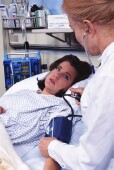
THURSDAY, March 5, 2015 (HealthDay News) — Women having heart attacks get to the hospital for treatment later than men and are more likely to die, a new study finds.
Researchers analyzed data from more than 7,400 heart attack patients in Europe. They found that 70 percent of women took longer than an hour to get to a hospital that could treat them. Only 30 percent of men with heart attack symptoms took that long. The time to the hospital ranged from as few as five minutes to as long as three days, according to the researchers.
A major reason why women took longer to receive care was that they waited longer than men to call emergency medical services. Women waited an average of one hour to call for help versus 45 minutes for men, according to the study.
“Our findings should set off an alarm for women, who may not understand their personal risk of heart disease and may take more time to realize they are having a heart attack and need urgent medical help,” study author Dr. Raffaele Bugiardini, a professor of cardiology at the University of Bologna in Italy, said in an American College of Cardiology news release.
But even after calling for help, women “seem to disappear somewhere in the health care system,” Bugiardini said.
Delays in receiving hospital treatment — whether because women waited longer to call for help or were not taken to hospital as quickly as men — were associated with a higher risk of dying.
Women were nearly twice as likely as men to die in the hospital, 12 percent vs. 6 percent. Women’s risk of dying remained higher even after the researchers accounted for factors such as age, treatments received, and heart disease risk factors.
The study also found that women were slightly less likely than men to undergo treatment to open clogged arteries, which tend to be most effective in the first hour after a heart attack strikes.
After being admitted to hospital, there were no major differences between women and men in the average time it took them to receive clot-busting drugs or balloon angioplasty to open blocked arteries.
One reason why women may delay seeking treatment is a lack of “classic” signs of heart attack, such as intense chest pain. Instead, they may have shortness of breath, nausea or vomiting, or pain in the back, neck or jaw, and their symptoms may develop slowly over hours or days or even come and go, according to the researchers.
The study is to be presented March 14 at the annual meeting of the American College of Cardiology in San Diego. Findings presented at meetings are generally considered preliminary until they’ve been published in a peer-reviewed journal.
More information
The U.S. Office on Women’s Health has more about heart attack.
Copyright © 2026 HealthDay. All rights reserved.

